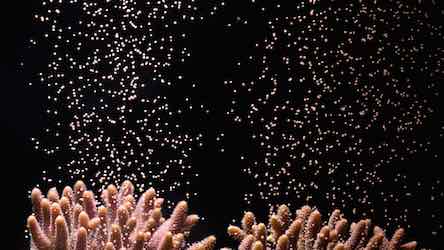
The world’s biggest living organism, the Great Barrier Reef, has held its annual Coral Spawning event, with trillions of eggs and sperm simultaneously releasing into the ocean making the underwater world more akin to a snow globe. We have exclusive video footage.
Some of the most extreme and beautiful off-grid locations in the world are around coral reefs – in New Zealand Australia and the Bahamas, as well as Hawaii and elsewhere in the Pacific. but its rare to get shots of the way these reefs grow – known as spawning.
Spawning events and egg production revealed a peak breeding season from November through May, which coincides with temperatures below 30 degrees C. Noticeably fewer spawning events and smaller clutch sizes occurred during the warmer months (30-31.5 degrees C) of June through October. Within the spawning season, egg production increased weakly leading up to the new moon and decreased after the full moon.
About 600 types of coral can be found in the Great Barrier Reef Marine Park, and all of them come in a variety of shapes, sizes and colors. Despite looking like plants, corals and colonies are very small animals called coral polyps which are clsoely related to jellyfish and come in two common types, hard and soft.
Hard corals act as a building blocks for the Reef that form when colonies of coral polyps produce limestone skeletons to support themselves. In most cases, a hard coral consists of hundreds, thousands, or even millions of individual coral polyps living together as a colony.
Soft corals are flexible because they lack a solid skeleton which means they are often mistaken for plants. Instead, they are supported by tiny limestone spike-like structures called spicules.
The Great Barrier Reef is the world’s biggest coral reef system on Earth stretching 2,300 kilometers from the tip of the Cape York Peninsula to Bundaberg. It is Queensland’s tourism asset with around two million visitors experiencing the reef each year!
For more information on holidays to Queensland go to